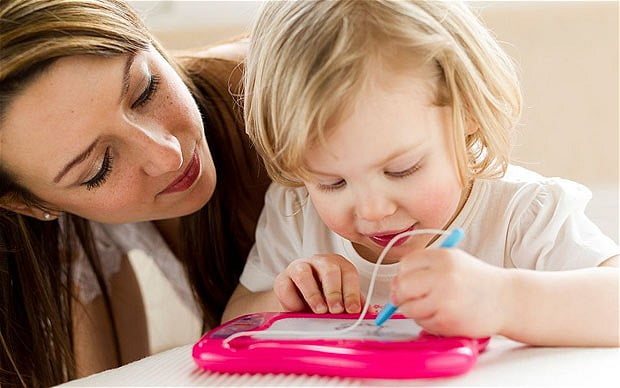Today I want to share something I learned from Carol Kingsley more than twenty years ago. To give you a little more background on this subject, I am going to tell you that I grew up in a very Italian family. By nature, Italians tend to be very loving, emotional people. While that is a generality, by my observation I’d have to say that is mostly true. In my family it was not uncommon to see within a half-hour period my mother sternly asking me to get a chore done, yelling at my laziness, then kissing me and praising me for my accomplishment, then yelling again at my sister, then hugging her and sitting her down to quietly teach her something, then more yelling (I’m not really sure why)…, etc, etc. etc. There is just a lot of emotion in my family and we are definitely loud in our praise and in our disappointments. This is the background I came from and the example I had.
So when my son was little and when his friends were around, if it got loud I got louder. I seldom managed to get control in. I decided, “I am just better with older kids and teens,” and left it at that.
Then one day Carol Kingsley did a special seminar for the children in my area. I had heard about Carol and her successes with children, so I thought, “I really want my son to attend this lecture.” He was six years old.
I had time on my hands and so I stayed to listen to the lecture myself in case I could learn something, and learn something I did. As the children became more loud and animated Carol became more calm and quiet until she was almost whispering. Immediately the children quieted down and I could see that it became easier for her to maintain order. To be honest, when watching it I couldn’t quite see what it was she did that actually caused them to quiet down. I just saw them become calmer and listen to her. So when the lecture was over, I just had to find out what it was she did exactly. I made it a point to go over to talk to her.
Carol is very approachable and was happy to spend a minute or two with me to answer my questions. She obviously cared. I explained the trouble I had in this area and how I had seen her gain control so easily and asked her how she did that. She asked me, “What did you observe?” I told her exactly what I wrote above. Then she answered, “That is how I did it.” I was confused; I still didn’t recognize it. So she patiently explained to me that the louder and wilder children get, the calmer and quieter you become. If you are talking low they stop what they are doing to listen more carefully, they are interested because they are curious as to what you are saying. So they calm and quiet down to listen. If you then use good communication that is full of affinity, care and love with no doubt that your requests will be complied with, they will follow through. If you are willing to handle any objections- again with good communication, acknowledging their communications and objections to you, then all will go exactly the way you intend it to go.
The idea that I could get compliance without yelling was a little unreal to me. Honestly I was still convinced it was just a “Carol” thing; like she had some hidden technology or magic that I did not have. But I promised I would try it, so I did. Now I have to tell you, how a person gets something to work when one is so convinced it won’t is a mystery to me, but work it did. The next time my son and his friends were “out of control”, I came into the room and calmly talked very low. Immediately they stopped their very wild playing to listen to me. I handed them something else to do and gave them all a snack. Order was regained and the children had more fun in their play. I was shocked! Surely it was a fluke. I tried it again and again and each time it worked.
Now do I always remember to use that? Well, I’m sure my daughter will be the first to tell you I am still very “Italian” in my approach to parenting, but then I will remember to use it eventually. Professionally I always use it with great success.
Since that time I have become much more educated in the exact technology Carol uses to handle children and adults. I have found that there are no hidden secrets or magic really. She just had access to a very workable technology. You too have access to this technology if you just ask. For more information about this or for help with your family situations do contact Mace-Kingsley Family Center at 727-442-3922 or [email protected].
Wishing you miracles,
Diane DiGregorio Norgard
Mace-Kingsley Family Center



